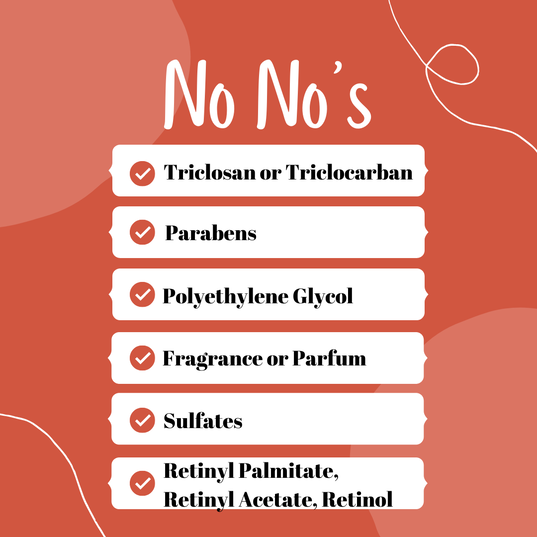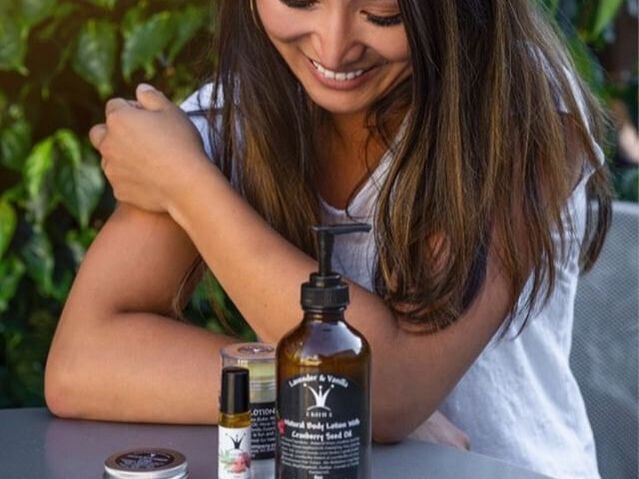 Every day there are headlines highlighting the dangers of chemicals that can be found in our food supply. Consumers are more aware than ever about the dangers of chemicals in processed food or pesticides that are used to grow our fruits and vegetables. People are reading nutrition labels and choosing to buy organic. Yay! Not only is there an increase in awareness about what we put IN our body but also what we put ON our body. Double Yay! Our skin is the largest organ of the body. Think of your skin as your flexible shield. "On guard!" This thin shield at only a few millimeters thick, has the prime job of protecting blood vessels, muscles, bones and tendons. It shields your body from bacteria and UV radiation. Your skin allows you to feel the sensation of touch, heat, cold, pressure, itching and pain. Skin also functions as a large storeroom for the body: The deepest layer of skin can store water, fat and metabolic products. And it produces hormones that are important for the whole body. Your flexible shield also regulates body temperature, water loss and some nutrient levels. As you can see, our skin is extremely important and almost magical since it can actually repair itself. Imagine if our bodies still displayed every scrape, cut, or bruise that we ever received. Ewww. David. Well, if our skin is so magical doesn't it protect us from absorbing chemicals that may be in skin care products? Sorry, unfortunately this is where our flexible shield can fail us. Darn. Or benefit us as in pain medication via a transdermal patch, or the topical application of magnesium, or other nutrients. Oh nice. Our bodies are capable of absorbing all kinds of chemicals or nutrients through the skin. This is called dermal absorption. It is the transport of an ingredient from the outer surface of the skin into the body. Chemicals commonly used in skin care products could potentially result in systemic toxicity or bioaccumulation. As these chemicals enter the blood stream they can cause a myriad of health problems if they are not flushed away by the body. In an eye opening study conducted by the CDC, researchers sampled the blood of 10,000 subjects in an effort to determine 'chemical body burden'. They found that all samples contained hundreds of various synthetic chemicals. Huh? Yep, our bodies are contaminated with synthetic chemicals that linger in our bodies and can take decades to break down, if ever. What?! That's right. You most likely have at least 700 different synthetic chemicals in your body that shouldn't be there. What's maybe even more alarming is that these chemicals mix with each other to create a "cocktail effect". One single chemical may have no effect on its own. Yet, it may have damaging effects when combined with other chemicals in a so-called ‘cocktail’. Now I'm thirsty. What sources contribute to this cocktail that none of us want?
This information may make it feel like it is impossible to avoid toxic substances and we wish we could say that isn't true but our mama's taught us not to lie. Even people living in remote areas that grow their own food have been shown to have many toxins floating around in their bloodstreams. So cancel your moving plans and lets talk about what we can do to stay as healthy and chemical free as possible. I'm listening. Bioaccumulation occurs when an organism (that's you) absorbs a toxic substance at a rate greater than that at which the substance is eliminated. Your body has some remarkable filters; liver, kidneys, spleen, and the lymphatic system. These organs are like buckets. They work hard around the clock to filter out things that your body doesn't need. They would be the opposite of a hoarder. You may even hear them whisper "nope, nope, don't need that - let's throw it out". But over time some items settle to the bottom of the bucket - much like a junk drawer that is in desperate need of reorganizing. The more toxins you throw at your body's filters; the harder they have to work. Now I have a mental image of the oil change employee holding up my car's filthy air filter and shaking his head at the long overdue oil/filter change. If only it were that easy to just drive up and get a new liver when ours becomes filthy. Ha. Funny. Overtime with repeated toxin exposure our buckets may begin to overflow. Who put all this stuff in the junk drawer anyway? The result is a body that doesn't function properly. And as unique as our fingerprints, our bodies react and behave to this overload differently. It may appear in the form of hair loss, acne, brain fog, weight gain, rashes, fatigue, indigestion and even dementia. Many doctors believe that this toxin overload is the beginning of disease and cancer formation. Here is our list of the big No No's. Read your labels and if you see any of these ingredients - Run. Or at least put it back on the shelf. A great resource is EWG's Skin Deep. You can type in any ingredient and learn about the risks associated with it. It's a resource that our team uses before we work with any new ingredient.
It certainly can feel overwhelming as chemicals are all around us and we can't control everything. The good news is that if we can reduce exposures -even just a little bit- it does make a difference. UC Berkeley researchers led a study where they had teenage girls take a three day break from personal care products containing parabens, phthalates, and other chemicals of concern. After just three days, the levels of all these chemicals dropped in the girls' urine samples by 27-45 %. See just a small change can have an immediate positive impact! Good to know. By choosing to avoid parabens (Mr. Hormone Disrupters), or turning your nose up at "fragrance" (AKA endocrine disrupting phthalates) P.U., you're making a worthwhile difference in the toxic load on your body. Look for natural ingredients as opposed to synthetic. Synthetic ingredients are created and processed in a lab, and have no ties to nature or the natural world at all. These ingredients are derived from petrochemicals and often created to mimic what nature provides. Many (most) skin care manufacturers prefer synthetic because these ingredients are cheaper and more readily available. And since we cannot drive to Jiffy Lube and get a new filter for our bodies, make sure you help those filters by:
Don't rely on the government or a company to tell you that something is safe. Do your research and read labels. Just because the front of a lotion bottle has the word "natural" or "organic" doesn't mean that on the ingredient list you won't find a cocktail of toxins. How sneaky! Now run off and enjoy life. Don't stress the small stuff. Read your labels. Eat more cranberries. And clean out your junk drawer.
0 Comments
Leave a Reply. |
AuthorFormer teacher, author wannabe, forever a mom, and business owner. Archives
January 2024
Categories
All
|

 RSS Feed
RSS Feed
